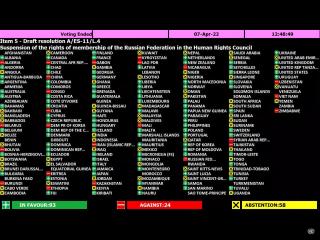
Today the UN General Assembly voted to suspend Russia from the UN Human Rights Council (HRC).
The resolution put forward by the US under the ongoing General Assembly Emergency Special Session on Ukraine passed comfortably with 93 votes in favour, 24 against and 58 abstentions.
The resolution cited previous General Assembly and Human Rights Council outputs as the basis for the suspension. Notably the General Assembly Resolution 60/251, which established the Human Rights Council in 2006 that states: “the General Assembly, by a two-thirds majority of the members present and voting, may suspend the rights of membership in the Council of a member of the Council that commits gross and systematic violations of human rights.”
UNA-UK welcomes this resolution - membership of the UN Human Rights Council is a privilege, not a right. Russia’s ongoing violations of international humanitarian law, the emerging accounts of the horrific acts of its forces in Ukraine, and the risk of escalating atrocities clearly fly in the face of the HRC’s objectives as well as its founding document, which states that membership should be the preserve of those who “uphold the highest standards in the promotion and protection of human rights.”
Voting to suspend Russia is only the second time the General Assembly has taken such a decision, after the decision to suspend Libya in 2011 on the recommendation of the Human Rights Council itself. We welcome this decision which marks a move towards membership of the HRC that is more meritocratic and standards-based.
Contrary to the statements of member states that voted against the resolution, Russia’s suspension does not weaken the UN human rights architecture, or the UN itself, but rather creates an opportunity to strengthen it. This decision does not shut Russia out of the UN or close the door to diplomacy, nor does it undermine the key role of the UN as a forum for dialogue. It does however demonstrate a clear message that Russia's actions are reprehensible and the majority of the world’s states will continue to work towards ensuring it is held accountable.
UNA-UK hopes this historic vote will be built on with further scrutiny of the records of all HRC members, and discussion on necessary reforms. Russia’s suspension raises a familiar issue around consistency and the selective implementation of standards. There are clearly multiple members of the HRC, past and present, with appalling human rights records deserving of scrutiny. UNA-UK has long maintained that the HRC should be strengthened more broadly, including by supporting the “Irish principles” whereby action is taken at the Human Rights Council in accordance with objective criteria. Such an approach would help reduce the politicisation of the Council and could help identify early warning signs of violations and hold states to higher standards.
Moving forward, it is vital the US, UK and EU work to maintain the coalition of support for Ukraine, and continue to bring pressure to bear on Russia for its actions. UNA-UK welcomed the UK’s recent support for the Uniting for Peace mechanism and we encourage them to continue to demonstrate support for measures to strengthen the General Assembly’s role on matters of global peace and security by voting in favour of Liechtenstein’s Veto Initiative.
In addition we call on the UK to rethink its planned Nationality and Borders Bill - which will have a profoundly damaging effect on the UK’s support for refugees. We also urge the UK to work with global partners to ensure that the fallout from this war beyond Europe - especially in relation to food security - is given due consideration, including in the General Assembly.
Read more:
- UN Briefing: Emergency Special Session of the General Assembly on the Russian invasion of Ukraine
- UN Human Rights Council votes to establish Commission of Inquiry on Ukraine
- UNA-UK urges MPs to oppose the Nationality and Borders Bill
- Read UNA-UK's Statement on Russia's invasion of Ukraine
- Ukraine - How you can help
Photo: Breakdown on the vote to suspend Russia from the HRC. Credit: Estonia Mission to the UN






